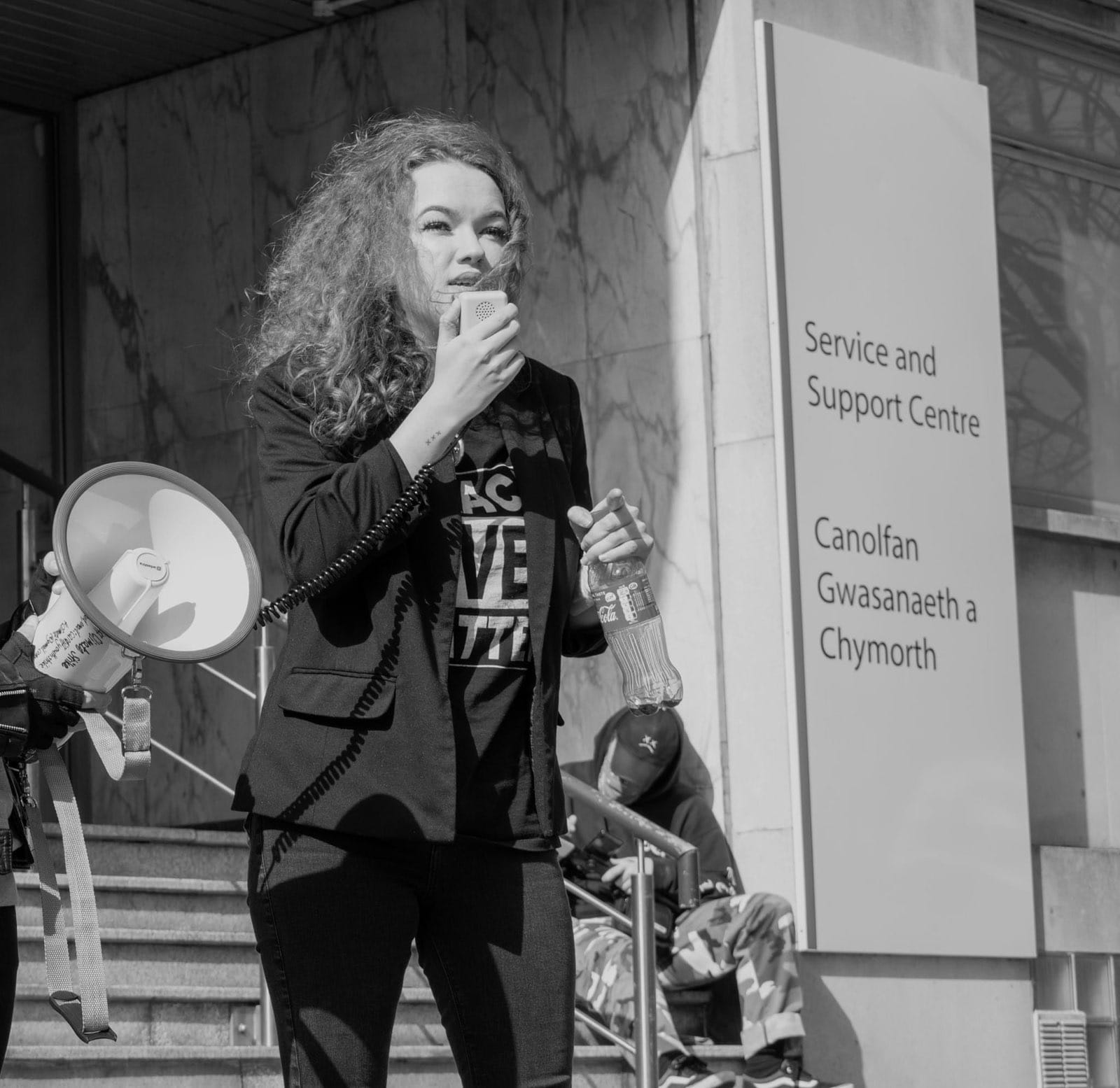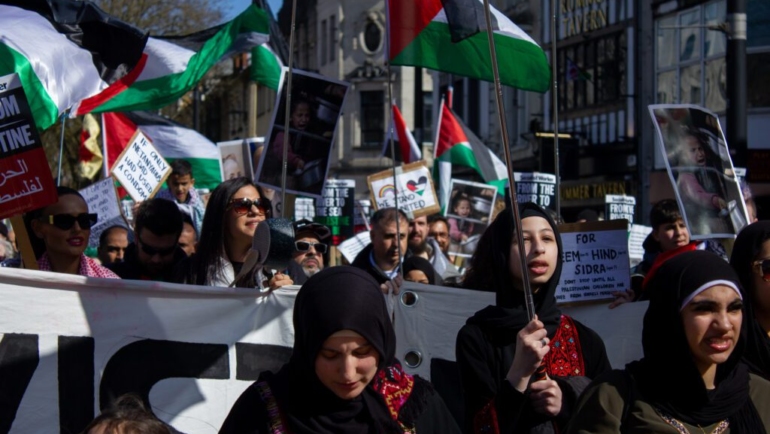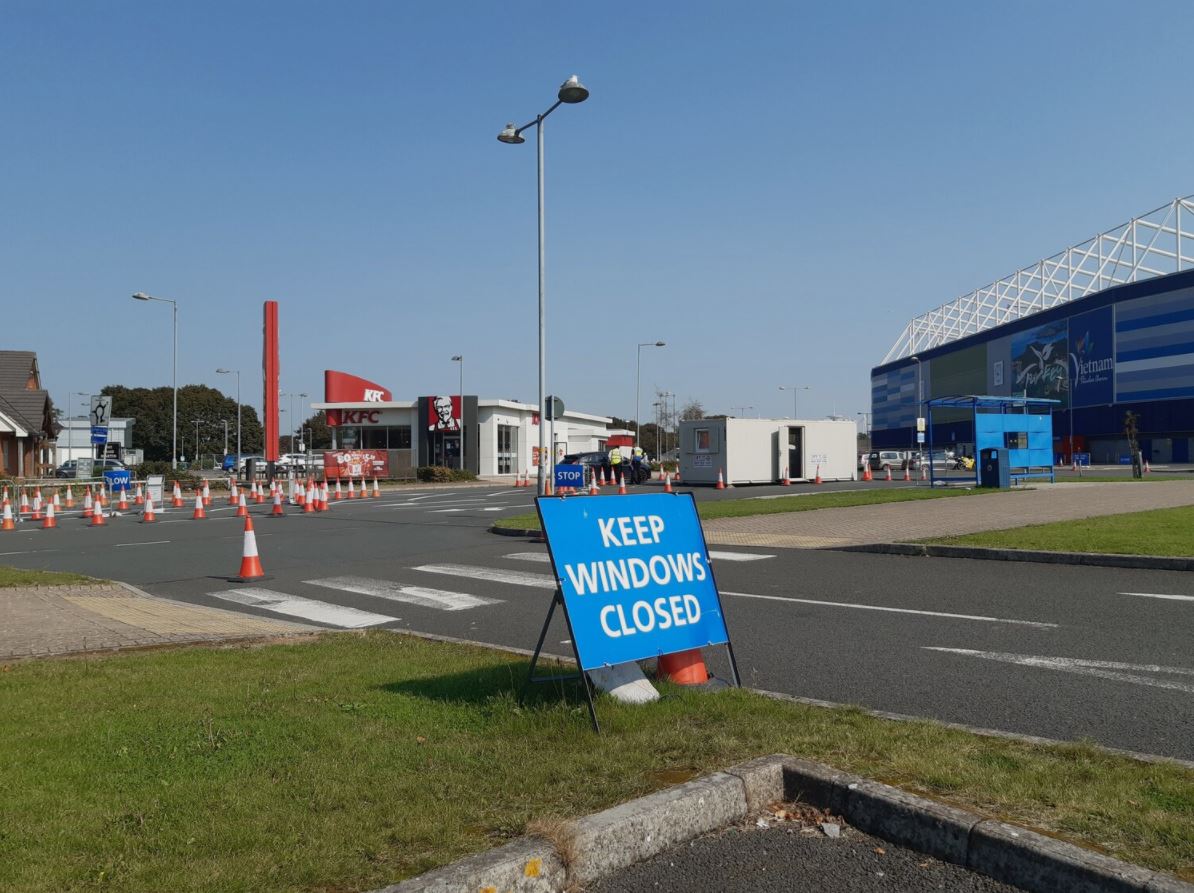
Listen In Depth: Secret Recordings Of South Wales Cops Trying To Recruit BLM Activist
• Last month the Guardian published an exposé revealing that cops tried to recruit a young Black Lives Matter protester from Swansea to inform on her friends.
• Now voice.wales are publishing the secret tapes that detail how the South Wales Police covert informant department tried to snare an activist.
• Lowri Davies, one of the central organisers of BLM Swansea, has written about her experiences in an article published alongside the new recordings.
Image: Lowri Davies, courtesy of Lowri Davies
When a young antiracist organiser Lowri Davies was phoned by an unknown number the last thing she thought was that it was a cop trying to make her a mole within Black Lives Matter Swansea. As soon as she realised that she was having a conversation South Wales Police wanted to be kept off-the-record, she started taping on her laptop.
Some parts of this call have been released in a Guardian podcast that accompanied the initial release. But Lowri has handed over the full recordings to voice.wales and this is our in-depth rundown of how that phone call happened. Some of these recordings have never been heard before.
The call on Tuesday 30th March 2021 starts with an officer from the force’s department dealing with undercover informants calling from an anonymous phone number. The cop on the other end of the phone explains that they’re allegedly trying to establish links within BLM Swansea to avoid “the potential violence that could erupt around certain protests” and to “get information, basically, which would potentially prevent any violent issues occuring.” Lowri asks why they haven’t come to see her in person.
TRANSCRIPT – “We’re not overt police officers, as in we wouldn’t just turn up to your home address and talk to you. We’re covert officers.”
Lowri goes on to ask for more information about the anti-social behaviour tip-offs the force are looking for. The officer tells the anti-racist organiser, who has maintained an open and honest relationship with a police liaison officer regarding her protests since she took an active role within BLM Swansea, about information on the far-right movement that would appear to be easily accessible from Lowri’s current relationships with her local cops.
TRANSCRIPT – “When arranging a peaceful protest is that potential for any risk that you can see that could potentially develop, persons turning up that may not be for your cause that could cause problems for yourself. That type of thing, you know. Because you obviously organising things wanting to go as peaceful as possible. And for any potential risk occurring from any possible other groups, from other organisations basically. If you’d have knowledge of that.”
Officer WIlliams goes on to verify she is aware of Lowri’s past contact with the police when the officer is challenged to verify her identity as a serving police officer. Lowri apologises for asking her to go to the extra effort of proving her credentials. Williams replies: “No it’s fine, It’s absolutely fine. I’m aware this call is sort of strange.”
Lowri asks Williams if she would be liaising with police constables or the covert intelligence department specifically.
TRANSCRIPT – “Our department, we work with police informants basically. It could be for a range of different reasons. Some persons speak to us because of involvement with drugs or burglary, it can be a range of different criminal activity that we get information of. Obviously in your case the reason for the contact is because of your involvement with the protests et cetera and past concerns previously that there could be issues on different events that you’re trying to organise, which you want to go peacefully. Just to see if there was anything you maybe could be able to help us with for anything surrounding these protests. From other groups that were going to turn up that could potentially cause issues.”
So would they want information on the far-right? Lowri asked. “Yeah basically stuff like that. And if you would know about these persons turning up prior to the event. From information you’ve gleaned from your own Facebook, or any social media groups you’re linked to, or any information you receive,” said Williams.
The officer goes on to underline the cloak-and-dagger tactics of being an informant when asked if she could be met at a police station.
TRANSCRIPT – “We don’t meet people at police stations, and we don’t meet people at their home addresses, again, because of the covert nature of my role we’re not seen anywhere. We arrange to meet you where we know that you’re not going to be compromised and nobody is going to see you with us.”
Williams then brought up the opportunity to meet in person during a car ride and made clear that their conversations were to be kept top secret.
TRANSCRIPT – “The only thing I will ask is for you not to tell anybody about this telephone call, just to avoid any potential compromise or threat of physical harm to yourself.”
Lowri goes on to ask whether she can verify the identity of the officer with her existing contact within the force who she liaises with regarding protests. The organiser is understandably worried about getting into a car for a covert police meeting when she is forbidden from telling her closest friends and family.
TRANSCRIPT – “[They] won’t know that I’ve made the contact with you. The only people who know about the contact we make with people are the people on my department.”
Williams verifies her identity by telling Lowri of dates on which she had made contact with the cops about protests from the force’s central database. Lowri asks whether they would like any information on BLM Cardiff and Vale specifically.
TRANSCRIPT – “I work in Swansea but cover a whole coast, so if there will be any information that would be relevant to other areas of course, I’m a police officer, I’m going to pass it on. Predominantly, the main reason for the call is our area. I only mentioned the Cardiff bit because you mentioned it on the report I’ve got in front of me… if there’s anything that comes up from any other areas, yes I would be interested.”
After the two arrange to talk over the phone the next day to set up an in-person meeting, Williams reminds Lowri again not to talk about her contact with the police.
TRANSCRIPT – “Just remember not to tell anybody. It’s really important not to tell anybody.”
At midday on Wednesday 31st March, Lowri receives her follow-up chat with Williams to be told the route to take for the secret meeting. Lowri tries to ask for a bit more information on what tip-offs the force are looking for, and from what groups in particular. Williams appears adamant to answer these questions in person. When Lowri enters the unmarked cop car later that day Williams and an accompanying officer force Lowri to prove that her phone is switched off so that it can’t record their conversation.
TRANSCRIPT – “Rather than going into reams and reams on the phone, it’ll be better when we speak in person because we would be able to explain our perspective on things to give you an understanding of where we’re coming from and see if you’re happy to assist in that angle. Rather than going into loads of discussion on the phone it’s much better to speak in person once you see the badge, once you see who we are. It’s a lot easier than having a random phone call from an unknown.”
Williams instructed Lowri a specific path to follow from her house which avoided main roads and took her to a cinema complex near the city centre, where she would have to phone the covert department again for further instructions. The officer emphasised during the exchange: “ensure that you follow the route.” The officer asks Lowri for a third time not to tell anybody.
TRANSCRIPT – “Can I just ask that you don’t tell anybody that you’re coming to meet with us and, as we tell everybody, not to bring any recording devices or anything like that with you please.”
The conversation rounds off with Williams helping Lowri construct a good alibi for her friends who might ask her where she’s going as she’s on her way out. The activist said she would just tell them she ‘s going to Tesco whereas the officer, trained in how to tell lies to inquiring friends, suggests for her to pretend she’s going to B&M because it’s in Lowri’s direction of travel and avoids more suspicion.
The conversation ends there and the rest of the interactions can be found in this comment piece by Lowri. Lowri’s quick reactions and recordings have provided us with a unique insight into how police seek out information from left-wing circles through deception.



2 Comments
Comments are closed.